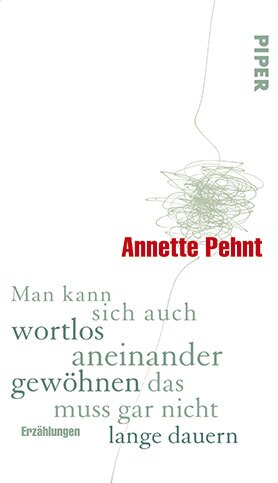Annette Pehnt
Man kann sich auch wortlos aneinander gewöhnen das muss gar nicht lange dauern
[You can even get used to each other wordlessly, it doesn’t have to take long at all]
- Piper Verlag
- München 2010
- ISBN 978-3-492-05374-7
- 186 Pages
- Publisher’s contact details
Annette Pehnt
Man kann sich auch wortlos aneinander gewöhnen das muss gar nicht lange dauern
[You can even get used to each other wordlessly, it doesn’t have to take long at all]
This book was showcased during the special focus on Spanish: Argentina (2009 - 2011).
Sample translations
Review
Annette Pehnt (b. 1967) is not an author who finds her material in warm and comfy settings: homes for the aged or disabled, workspaces poisoned by bullying, marriages ailing from tristesse. Families you wouldn’t want to be raised by, locations that inspire anxiety, such as a room in the hospital where somebody has died, or a clinic’s storage room which serves as a makeshift maternity ward because nobody, except for the cleaning lady, cares for a woman who is about to give birth.
The first piece in Pehnt’s new volume of short stories is the odd exception: An ICE (Intercity Express) train conductor narrates, in first person, the events of her professional and inner life. Of course, she proves to be vulnerable, frustrated, crisis-ridden, hiding behind the facade of her trained smile and neat uniform. The fact that she introduces herself by three different names can only be interpreted as a sign that Annette Pehnt is not seeking to paint a realistic milieu study; rather she wants to subtly pull the reader into the more or less distorted world-and self-perception of her characters. Her language—sober, laconic, and, at first glance, artless—keeps the stories carefully balanced at the narrow edge between ordinary and downright disturbing.
The ICE-conductor has a relationship with the passengers that goes beyond the scope of her job description: she enjoys their physical closeness, registers the nuances of communication, projects her unfulfilled longing for human contact in the brief encounters with the passengers, has affectionate or odious fantasies about where they have come from and where they are going.
You can even get used to each other wordlessly, it doesn’t have to take long at all –is the key phrase from the train conductor’s monologue, and is also the title of the collection of short stories. A clunky title with the air of a desperate mantra: In fact, upon closer inspection, all the characters in these stories are similarly needy, they need to be touched, comforted, to be assisted in a setting from which they have grown alienated, or in which they never were able to gain a foothold.
You can wish for anything is the title of a story that describes the pecking order and hierarchy, exclusion and isolation in a home for disabled children – perhaps it too closely resembles a work of social research for it to achieve the level of irritation she creates in the most successful of the stories. Such as George, the frail, withdrawn, autistic boy who develops an unnatural affinity for birds and grows more and more like a bird: his slightly deformed fame, an oblique allusion to his 60s parent’s dreary, ordinary lives.
Related to this is the imperceptible deformation, left on a woman’s face after suffering a brain hemorrhage. It causes her family to cancel their trip to Sweden. This choice of words, it seems, characterizes the author’s own technique of minimal displacement and irregularity making tangible the fragility of all norms, plans and ways of life.
Is it the desire for attention that drives a young woman to an old Chinese woman’s beauty parlor which boasts the slogan: Beauty slumbers in your face, only you’ve forgotten where it is. Something has been lost in human intercourse, like the black stone from a Greek island that the mother of two siblings wore for half a century as a talisman; it disappeared from her night table at the hospital intensive care unit and after her death could not be found again.
The train conductor suffers from a sudden loss of hearing and seeks support from a stranger traveling on the train. She wishes she’d hug me even tighter and stroke my hair and caress my face. The train travels nowhere. Annette Pehnt stays on track with her discrete and intractable observations, which allow us a deeper understanding of those who are remote and peculiar. The outsiders are among us - it would be a sign of humanity to get used to them wordlessly and without further ado.

The first piece in Pehnt’s new volume of short stories is the odd exception: An ICE (Intercity Express) train conductor narrates, in first person, the events of her professional and inner life. Of course, she proves to be vulnerable, frustrated, crisis-ridden, hiding behind the facade of her trained smile and neat uniform. The fact that she introduces herself by three different names can only be interpreted as a sign that Annette Pehnt is not seeking to paint a realistic milieu study; rather she wants to subtly pull the reader into the more or less distorted world-and self-perception of her characters. Her language—sober, laconic, and, at first glance, artless—keeps the stories carefully balanced at the narrow edge between ordinary and downright disturbing.
The ICE-conductor has a relationship with the passengers that goes beyond the scope of her job description: she enjoys their physical closeness, registers the nuances of communication, projects her unfulfilled longing for human contact in the brief encounters with the passengers, has affectionate or odious fantasies about where they have come from and where they are going.
You can even get used to each other wordlessly, it doesn’t have to take long at all –is the key phrase from the train conductor’s monologue, and is also the title of the collection of short stories. A clunky title with the air of a desperate mantra: In fact, upon closer inspection, all the characters in these stories are similarly needy, they need to be touched, comforted, to be assisted in a setting from which they have grown alienated, or in which they never were able to gain a foothold.
You can wish for anything is the title of a story that describes the pecking order and hierarchy, exclusion and isolation in a home for disabled children – perhaps it too closely resembles a work of social research for it to achieve the level of irritation she creates in the most successful of the stories. Such as George, the frail, withdrawn, autistic boy who develops an unnatural affinity for birds and grows more and more like a bird: his slightly deformed fame, an oblique allusion to his 60s parent’s dreary, ordinary lives.
Related to this is the imperceptible deformation, left on a woman’s face after suffering a brain hemorrhage. It causes her family to cancel their trip to Sweden. This choice of words, it seems, characterizes the author’s own technique of minimal displacement and irregularity making tangible the fragility of all norms, plans and ways of life.
Is it the desire for attention that drives a young woman to an old Chinese woman’s beauty parlor which boasts the slogan: Beauty slumbers in your face, only you’ve forgotten where it is. Something has been lost in human intercourse, like the black stone from a Greek island that the mother of two siblings wore for half a century as a talisman; it disappeared from her night table at the hospital intensive care unit and after her death could not be found again.
The train conductor suffers from a sudden loss of hearing and seeks support from a stranger traveling on the train. She wishes she’d hug me even tighter and stroke my hair and caress my face. The train travels nowhere. Annette Pehnt stays on track with her discrete and intractable observations, which allow us a deeper understanding of those who are remote and peculiar. The outsiders are among us - it would be a sign of humanity to get used to them wordlessly and without further ado.
Translated by Zaia Alexander

By Kristina Maidt-Zinke
Kristina Maidt-Zinke is a book and music critic at the Süddeutsche Zeitung and also writes reviews for Die Zeit.
